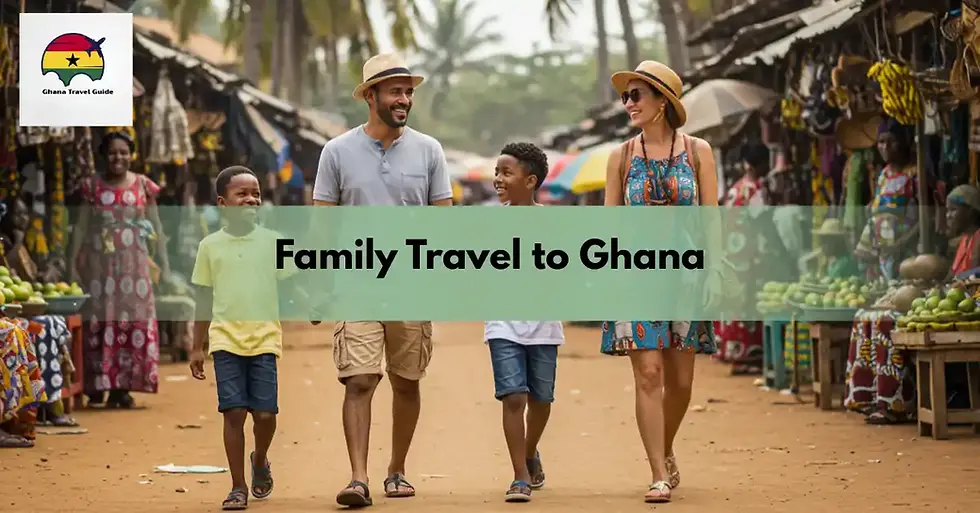Learn These 10 Ghanaian Phrases Before You Visit
- Ethan Brooks

- May 21
- 4 min read
Updated: May 22
Before my first trip to Ghana, I didn’t think much about the local language. I knew people spoke English, so I figured I’d be fine. But once I got there, I realized something—knowing a few Ghanaian phrases made a big difference. People smiled more, warmed up quicker, and I felt more connected.
Most Ghanaians speak English, especially in the cities. But the real heart of daily life? That’s found in local languages, especially Twi—one of the most spoken languages in Ghana.
Simple Twi phrases that helped me a lot
Here are 10 simple Twi phrases I learned that helped me a lot. If you’re planning a trip, I’d say: learn Twi basics. You don’t need to be fluent, just enough to show you’re trying. It goes a long way.

1. ɛte sɛn? – “How are you?”
This is how you say hello in a friendly way. It's more than just a greeting—it's a way to show respect. People in Ghana love greetings, especially when you try in their language. You’ll hear this a lot, and saying it back shows that you care.
2. Me ho yɛ – “I’m fine”
This is how you answer when someone asks how you’re doing. It’s a polite and simple response. It helps you carry on the conversation, even if you don’t speak much more Twi.
3. Medaase – “Thank you”
One of the most important words to know. Say thank you in Twi when someone helps you, gives you directions, or serves you food. It shows respect, and people appreciate it more than you’d expect.
4. Mepaakyɛw – “Please”
Use this word anytime you're asking for something. Whether you're ordering food, asking for help, or even haggling in a market, saying “please” softens your request and shows good manners, which are very important in Ghanaian culture.
5. Aane – “Yes”
This is the simple way to say “yes.” You’ll use it a lot in taxis, markets, and conversations with locals. It’s easy to remember and helpful in almost any situation.
6. Dabi – “No”
This one’s just as important as “yes.” You’ll need it when you want to politely turn something down, like if a street vendor is trying to sell you something you don’t want. It’s respectful and direct.
7. Maakye – “Good morning”
Use this in the morning when greeting people. Saying good morning in Twi is a great way to start the day right, whether you're talking to your guesthouse host or a local shopkeeper.
8. Maaha – “Good afternoon”
This is the greeting to use in the afternoon. Again, greetings in Ghana are important—people expect them and appreciate when you take the time to say them properly.
9. Maadwo – “Good evening”
Use this when the sun starts going down. Even if you're walking past someone on the street, saying “good evening” in Twi can make them smile.
10. Mente aseɛ – “I don’t understand”
This phrase helped me so many times. If someone’s speaking to you in Twi or another Ghana language and you’re lost, just say this. People will usually switch to English or slow down and help you. It’s better than just staring blankly.
Should You Learn Twi Before Going to Ghana?
You don’t have to be fluent, but learning some Twi language basics is a smart move. It helps with daily things like buying food, greeting people, and understanding local signs or conversations.
Is Twi Hard to Learn?
Not really. It’s not a hard language to pick up, especially the basics. A few words can carry you far. If you're wondering “Is Twi hard to learn?”, the answer is no—at least not at the beginner level.
Do People Speak English in Ghana?
Yes, English is the official language, and it’s widely spoken. But in daily life, especially outside the big cities, people often speak Twi or other Ghanaian languages. That’s why these phrases come in handy.
Final Tips on Language and Culture in Ghana
Always greet people first. It's part of everyday life.
Be polite. Use “please” and “thank you” often.
Don’t worry about mistakes. People love it when you try.
Watch how locals speak. You’ll learn faster.
Respect local customs and communication. Language is a big part of that.
Final Thought:
Learning these 10 phrases changed how I experienced Ghana. I didn’t just feel like a tourist—I felt like a guest. People noticed I was trying, and that effort made all the difference.
So go ahead, pick a few of these to memorize before your flight. You’ll be glad you did.
Medaase!
FAQs
Q: Are there differences between Twi and Akan language phrases?
Yes. Twi is a dialect of the Akan language family, so while Twi phrases are very common, other Akan dialects like Fante are spoken in different regions. Most travelers focus on Twi since it’s the most widely spoken dialect.
Q: How do I practice Twi before visiting Ghana?
There are easy ways to learn Twi language basics before your trip:
Use free language apps or YouTube videos focused on Twi phrases.
Listen to Ghanaian music and try to pick out common words.
Practice greetings and thank-yous with friends or online language groups.
.png)



Comments